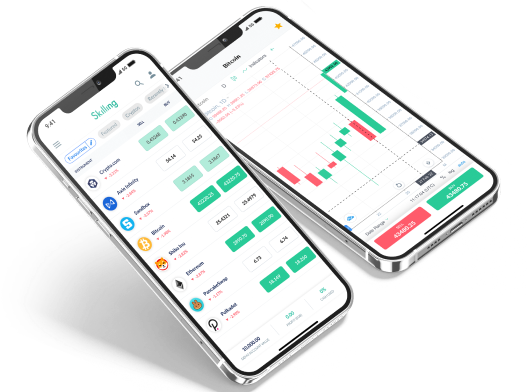Access 1,200+ global CFDs instruments.
Access a plethora of trading opportunities across the financial markets.

If you have ever considered investing or trading, you might have encountered the term "financial broker." Financial brokers play a crucial role in connecting investors with financial markets. They provide services like executing trades, offering investment advice, and managing portfolios. There are different types of financial brokers as you'll learn below.
What is a financial broker?
A financial broker is a person or firm that helps individuals and businesses buy and sell financial assets like stocks, bonds, Forex, and commodities. They act as intermediaries between buyers and sellers in financial markets. Brokers execute trades on behalf of their clients, provide investment advice, and often manage investment portfolios. Their role is to facilitate transactions efficiently and help clients achieve their financial goals through informed decision-making and market expertise.
Practice with a Demo Account
Try our demo account and experience real market conditions.

What does a financial broker do?
A financial broker helps people and businesses navigate the complexities of investing in financial markets. They perform several key tasks:
- Executing trades: Brokers buy and sell financial assets like stocks, bonds, and currencies on behalf of their clients. For instance, they might help you invest in precious metals by providing up-to-date information on the gold price today or silver price today.
- Providing advice: They offer guidance and recommendations based on market research and their expertise to help clients make informed investment decisions.
- Managing portfolios: Some brokers manage investment portfolios, adjusting holdings to align with clients' financial objectives and market conditions.
- Offering services: They may provide additional services such as financial planning, retirement advice, and risk management strategies tailored to clients' needs.
Overall, financial brokers play a crucial role in helping individuals and businesses grow their wealth and achieve their financial goals through strategic investment management.
Types of financial brokers
There are several types of financial brokers, each specializing in different aspects of the financial markets:
- Stockbrokers: These brokers facilitate buying and selling of stocks (shares) such as Tesla (TSLA) and more on stock exchanges.
- Forex brokers: Forex brokers specialize in trading foreign currencies such as EURUSD. They help clients access the foreign exchange market and execute currency trades.
- Commodities brokers: These brokers deal with trading commodities such as gold, cocoa, wheat, and other raw materials. They help clients buy and sell commodity futures contracts.
- Bond brokers: Bond brokers assist clients in buying and selling bonds, which are debt securities issued by governments and corporations. They provide insights into bond market conditions and yield rates.
- Options brokers: Options brokers help clients trade options contracts, which give the right (but not the obligation) to buy or sell an asset at a predetermined price within a specified timeframe.
- Financial advisors/planners: While not traditional brokers, financial advisors or planners offer investment advice, retirement planning, and overall financial guidance. They may also help clients with estate planning and tax strategies.
Experience Skilling's award-winning platform
Try out any of Skilling’s trading platforms on the device of your choice across web, android or iOS.

Summary
Whether you're interested in stocks, currencies, commodities, or bonds, there's a broker specialized to help you achieve your investment goals. Trading and investing in financial markets involve risks. Prices of financial assets can fluctuate significantly and may result in losses. It's important to carefully consider your financial situation, risk tolerance, and investment objectives before engaging with any financial broker or trading platform.
Are you a Skilling client yet? Skilling is a reputable and award-winning CFD broker that gives you access to 1200+ global assets in the form of CFDs such as stocks, cryptocurrencies, Forex, commodities, and more. Open a free Skilling account today and enjoy low spreads on your favorite assets.
FAQs
1. What is a financial broker?
A financial broker is a person or firm that facilitates the buying and selling of financial assets on behalf of clients. They provide access to markets and execute trades based on client instructions.
2. What services do financial brokers offer?
Financial brokers offer a range of services including executing trades in stocks, bonds, currencies, and commodities. They also provide investment advice, portfolio management, financial planning, and risk management strategies.
3. How do I choose the right financial broker?
Consider factors such as the broker's reputation, fees and commissions, range of services offered, customer support, and regulatory compliance. Choose a broker that aligns with your investment goals and trading preferences.
4. What are the different types of financial brokers?
Types of financial brokers include stock brokers (for stocks), Forex brokers (for currencies), commodities brokers (for commodities), bond brokers (for bonds), options brokers (for options contracts), and financial advisors/planners (for comprehensive financial advice).
5. How are financial brokers compensated?
Brokers typically earn commissions on trades executed on behalf of clients. They may also charge fees for other services such as financial planning or portfolio management. Some brokers operate on a fee-only basis without earning commissions from trades.
6. Are financial brokers regulated?
Yes, reputable financial brokers are regulated by financial authorities in their respective countries or regions. Regulation ensures brokers adhere to strict standards of conduct, safeguard client funds, and maintain transparency in their operations.
7. What risks are associated with using a financial broker?
Risks include market volatility, potential losses on investments, broker insolvency, and risks associated with leverage (if applicable). Investors need to understand these risks and carefully manage their investments.
8. Can I trade with a financial broker online?
Yes, many financial brokers such as Skilling offer online trading platforms that allow clients to trade and manage their investments from anywhere with Internet access. These platforms provide real-time market data, research tools, and account management features.











